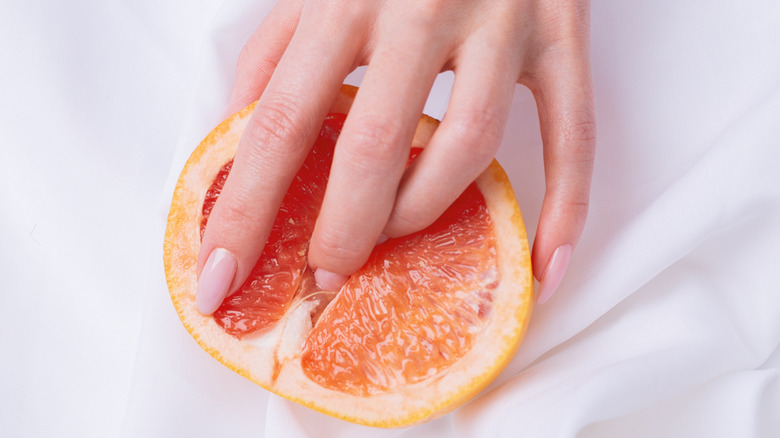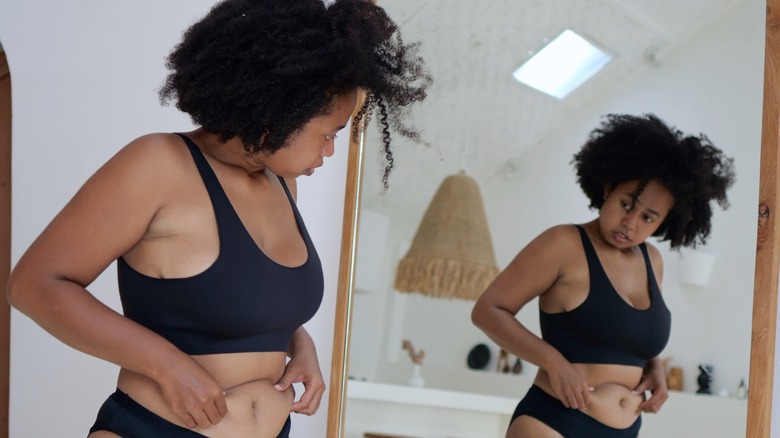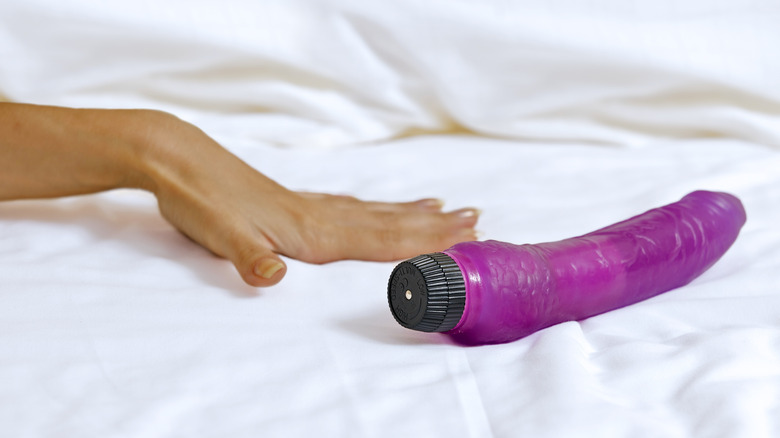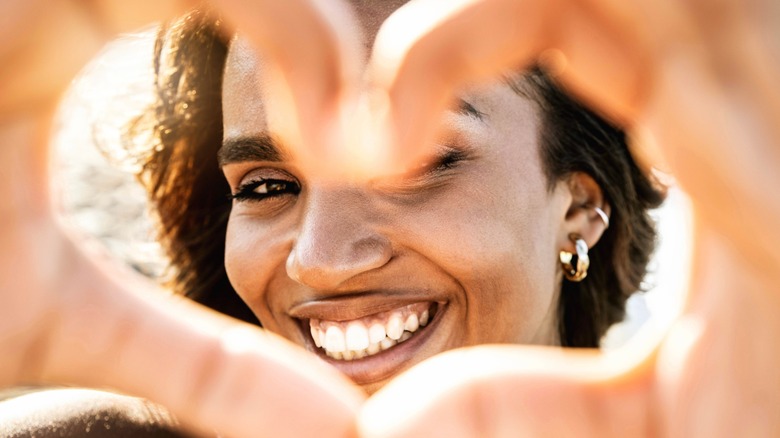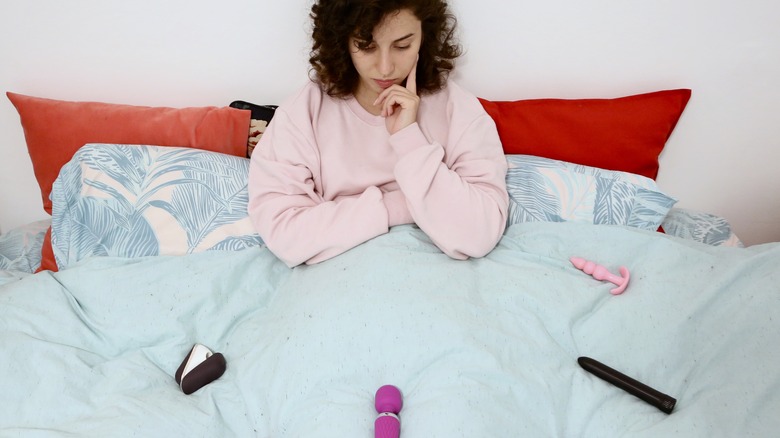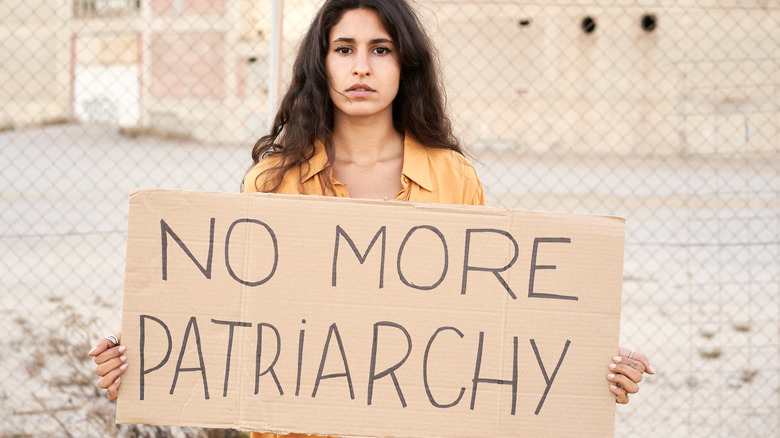5 Reasons Self-Pleasure Is A Feminist Act
Although May is known as International Masturbation Month — a little alliteration at play there — you don't need a specific month to indulge in some solo, self-pleasure activities. Heck, you don't even need a specific reason to masturbate; just being bored can be all the justification you need. It's psychologically and physically healthy, you don't have to worry about STIs or pregnancy and, as the saying goes, "It's sex with someone you love." It's everything one could want. It's also a feminist act: something we sometimes forget in the heat of the moment.
When we masturbate, we own our sexuality. In doing this we're not just fighting against stereotypes, but we're working toward destigmatizing taboos. According to a 2020 survey by Glamour, 91% of people who identify as women masturbate, 36% do it two to five times a week, and 67% prefer vibrators to other modes of self-pleasuring. But despite all this, the survey also found that 53% of the participants are uncomfortable talking about it, with 83% citing the stigma surrounding female masturbation as the reason. Do you think people who identify as men have such a hang-up? Probably not.
Even if you don't want to talk about it or are hesitant to admit you do it, people masturbate — people of all genders. It's an empowering act of self-love, self-expression, and self-care. Masturbation is, without a doubt, a feminist act. Let's unpack the reasons why.
It helps you to appreciate your body
We live in a society where, if you identify as a woman, you can't win when it comes to your looks. You're too thin, too fat, too tall, too short, or too old. Then, should you dare to get any sort of plastic surgery so you can fit society's prescribed idea of perfection, you get judged for not accepting yourself.
Because of the pervasiveness of women struggling to accept their bodies, in 1984 a team of researchers came up with the term "normative discontent," which basically means it's normal to be dissatisfied with your body. But if you look past the media, celebrities, Instagram filters, and Photoshopped photos, and allow yourself to have a clearer image of what's attractive, you'll see there's no one type of beauty. If you can get that far in your personal body image journey, then you can reach a point where you appreciate your body and all that it's capable of. Masturbation, in which you explore yourself from head to toe, can help in finding that appreciation.
When you masturbate, you discover things about your body that you wouldn't have realized otherwise. You experiment and revel in how it reacts to certain types of touch and sensations. Just the fact that the clitoris exists purely for pleasure should open your eyes to how fantastic your body is. You don't need the media or society to decide that your body should be loved and admired. You can do that on your own, as you learn to appreciate it more and more through self-exploration.
It defies gender stereotypes
It's only been in the last 10 years or so that female masturbation has become a topic that people discuss — although, some are still whispering about it. In fact, as recently as 1973, an article in Cosmopolitan, of all places, actually had a line that read, "Women do not have sexual fantasies, period. Men do." Naturally, if this was the thinking by some in 1973, it's safe to assume that women couldn't possibly be masturbating back then or before that, because what would they fantasize about? Doing laundry or cleaning the floor? Of course they were fantasizing and jerking off — and it wasn't about laundry detergent.
Although gender stereotypes have shifted, especially because gender identity has changed and we now know there are more than just two genders, there's still a lot of feminist power behind the act of masturbation. You're indulging in something that not only feels amazing but is also an activity that was once assumed to be something that only people with penises did.
It's a form of self-care
While we tend to think of self-care as getting a massage, facial, and taking a mental health day to do our own thing and sit with our feelings, that's just the tip of it. With its roots in the Civil Rights Movement, self-care is more than just pampering and indulging. It's self-preservation.
"Holistic needs of Black communities and Black activists have always been a part of community organizers' tactics," postdoctoral research fellow at Penn State University Maryam K. Aziz, Ph.D. tells Teen Vogue. "Black women, often queer, pushed other activists toward caring for themselves as a necessary, everyday revolutionary practice."
Self-care is a feminist act in itself. So when you masturbate as part of your self-care routine, you're doubling down. Masturbation isn't simply about getting off and giving yourself a lovely glow. When we masturbate, oxytocin is released into the body which aids in lowering stress, anxiety, and depression. Orgasms are a natural painkiller, making masturbation great for menstrual cramps, headaches, and other aches and pains. It also makes you feel good about yourself, boosting your self-esteem and confidence. All these things contribute to self-preservation, keeping your mind and body healthy, and allowing for self-awareness on all levels. In fact, Glamour's 2020 survey found that 79% of respondents consider masturbation self-care and 77% reported it's their number one go-to when they need self-care.
It reaffirms your independence
You do not need a partner to orgasm. Repeat: You do not need a partner to orgasm. Some people equate masturbation, as well as other sex-related acts, as things that can't be done without a partner. But that's not true. If your partner and you have mind-blowing orgasms together, that's great! However, you shouldn't rely on them for your sexual satisfaction.
Masturbating asserts your independence. You're not relying on anyone but yourself for pleasure. Although this may not seem that big of a deal, when it comes to feminism it is. Men have long believed that women belong to them and that women couldn't exist without them. A perfect example of this is the Equal Credit Opportunity Act (ECOA) of 1974, which finally allowed U.S. women to have credit cards in their own name. Before that, if a woman wanted a credit card a man, usually her husband, would have to co-sign. Every bit of independence we have is something we shouldn't take for granted — that includes our ability to give ourselves orgasms.
It's a way to thumb your nose at the patriarchy
Although few seemed to have much of a problem with female masturbation thousands of years ago — a walk through the ruins of Pompeii is all the proof you need — things have drastically changed since then. Not only has the patriarchy, in many different ways by many different men (hello, Freud!) tried to strip us of our sexuality and sexual urges, but it even went so far as to create the notion that women were crazy and essentially needed to be masturbated by medical professionals in order to act civilized again. This disorder was called hysteria, and something from which only women could suffer.
But while the medical community has stopped diagnosing women with hysteria, the way female sexuality was treated during the Victorian Era made such an impact that even the roaring '20s and free love movement of the '60s and '70s couldn't break down certain ideas. Hence the reason 53% of women are uncomfortable talking about masturbation: It's something the patriarchy has instilled in us and in society as a whole.
While the feminist act of masturbation may not cross your mind every time you reach for your vibrator, just knowing, even subconsciously, is you doing your part — and orgasmically so.
